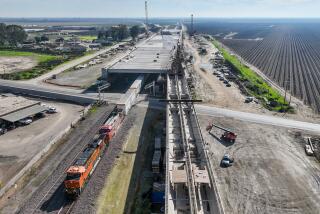Senator to Reopen Hearings on Alameda Corridor Jobs
- Share via
Concerned that employment forecasts for the Alameda Corridor project might be greatly exaggerated, a state senator who monitors transportation issues announced Thursday that he will reopen hearings held three months ago to assess how much the county’s jobless would benefit from the $2-billion rail and truck route.
State Sen. Quentin L. Kopp (I-San Francisco), chairman of the Senate Transportation Committee, said he wants to examine whether his panel was deceived by the Alameda Corridor Transportation Authority during public testimony in South Gate on April 16. Kopp said he hopes to reopen that hearing in late July.
The senator has received new information since the hearing that suggests that the number of jobs created by the Alameda Corridor might be far lower than official projections.
“I intend to reopen these hearings,” Kopp said. “We are going to go back to South Gate and the scene of the misrepresentations.”
The authority’s general manager, Gill V. Hicks, denied that his agency has deceived anyone. He said he welcomed the chance to defend the job estimates before Kopp’s committee.
The April hearings were held in relation to a bill by state Sen. Tom Hayden (D-Los Angeles), who proposed that 30% of the project’s total payroll be made up of residents from the economically depressed cities along the corridor’s path.
The route of the project, which will link the county’s ports to rail yards in downtown Los Angeles, passes through Wilmington, Compton, Carson, Lynwood, Huntington Park, South Gate and Vernon.
Unemployment has been as high as 39% in some of those cities, and the state’s economic recovery has been slow to take hold in those areas. As a result, one of the major benefits that corridor proponents, including Mayor Richard Riordan, touted for the projects is its potential for creating jobs.
The hearings tried to assess how many construction jobs, apprenticeships, non-construction positions and other economic benefits would go to impoverished residents in the so-called “gateway cities.”
Authority officials testified that 10,500 jobs would be created by construction projects alone. Of those, about 600 construction apprenticeships and 350 non-construction positions would be available to the unemployed from the gateway cities, corridor officials said.
As a result of that testimony and lobbying by authority officials, Kopp said, the Senate Transportation Committee killed Hayden’s legislation.
Since then, Hayden, who serves on the Senate Transportation Committee, has made Kopp aware of an analysis by Richard N. Slawson, executive secretary of the Building and Construction Trades Council of Los Angeles and Orange counties. Hayden asked Kopp to reopen the hearings.
On April 21, the same day Hayden’s bill was defeated, Slawson wrote the board of the Alameda Corridor Transportation Authority. He disputed the Alameda Corridor authority’s job forecasts, saying that based on his discussions with contractors, the project might generate only 700 to 800 construction jobs between now and the scheduled completion date in 2001.
“The number of workers projected to be employed on the project has been overstated to representatives of the corridor cities, community-based organizations and the residents,” Slawson wrote.
Instead of hundreds of jobs being generated a year for the unemployed, Slawson said, only about 50 apprenticeships might be available annually.
Alameda Corridor authority officials contend that the project already has generated more than 800 jobs and that thousands more will result when construction begins.
Duane Kenagy, director of engineering for the firm Moffat and Nicol, evaluated how many jobs would be created by the corridor. His analysis was based on such factors as the amount of building materials needed and the time required to complete certain tasks.
“We believe there will be hundreds of jobs made available to the unemployed in the corridor cities,” Hicks said. “We just have to make sure it will happen.”
More to Read
Get the L.A. Times Politics newsletter
Deeply reported insights into legislation, politics and policy from Sacramento, Washington and beyond. In your inbox twice per week.
You may occasionally receive promotional content from the Los Angeles Times.











